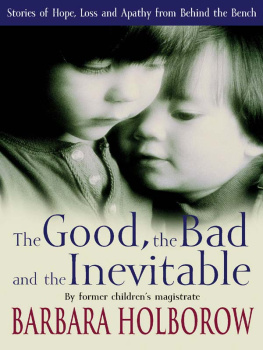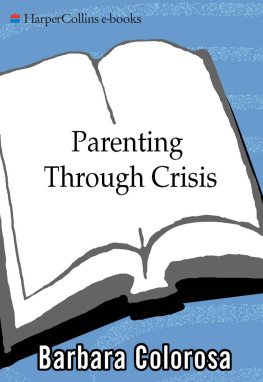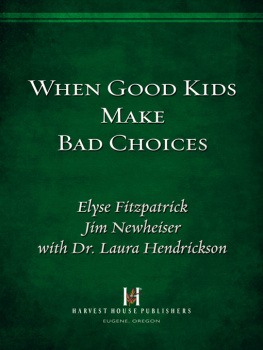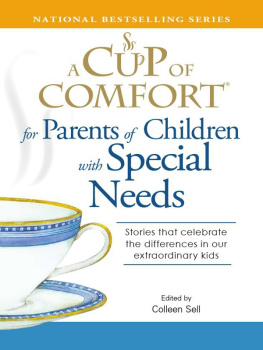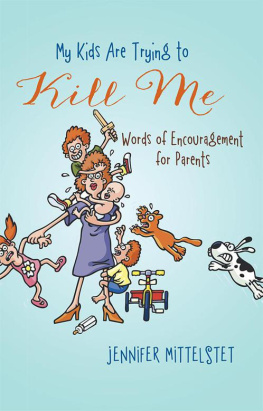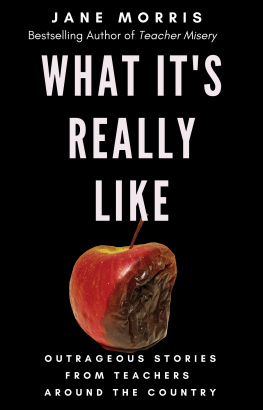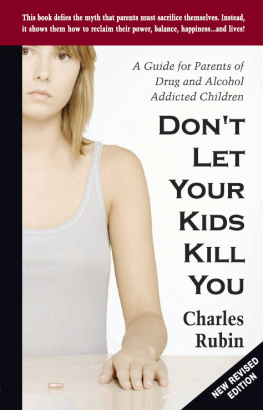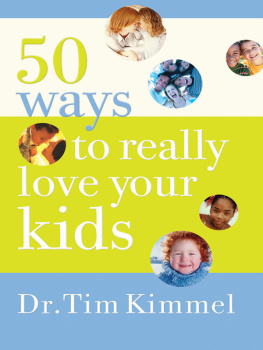
About the book
In this inspiring, moving and often funny collection of stories, bestselling author Barbara Holborow tells of The Good, The Bad and The Inevitable outcomes for so many of the kids she saw standing in front of her as Childrens Magistrate.
There are stories of the kids who, like broken glass jars, can never be mended due to the awful beginnings they have suffered. There are stories of the kids and their parents who are willing to make changes and turn their lives around with lots of hard work. There are stories of kids and parents who just dont care and who dont change. And there are also stories of the wonderful, inspiring kids and their carers (from parents, grannies and grandpas, foster parents and adoptive parents) who will do anything within their power to keep families together, to keep families loving and safe and who instill that important sense of hope for the future.
Barbaras motto is that everyone in a community has responsibility for every child. To illustrate this, throughout the book, interspersed between the stories, are snippets of Barbaras wisdom and tips for everyone on raising kids looking out for them, and keeping them happy and safe. After all-together we are one big family of humanity, and should look out for each other.
CONTENTS

To all those kids and parents
who embrace change
FOREWORD
Babies, toddlers, children, teenagers and young people all bring to the Childrens Court baggage which has either been heaped on them by others, been created by themselves or is just the result of unlucky circumstance. From where I sat for so many years behind my Bench, I could see that there were only three kinds of outcome for whoever was standing in front of me: the good, the bad and the inevitable.
There will always be parents who, for whatever reason, refuse practical help. Unfortunately its inevitable that their children will suffer some kind of neglect physical, emotional, sexual, psychological or financial regardless of the best help available. There will always be kids who, for whatever reason, also refuse practical help in the form of advice or support or counselling. These are the kids people like Father Chris Riley, Reverend Bill Crews and many others work tirelessly with, striving to save them from the inevitable: a life of misery, or death.
But fortunately, there will always be kids and parents who want to get it right, who work hard at turning their unhappy, miserable lives around. They will try their best and you can never ask more of a person than that.
These are the guys who keep the world going round and give us all that precious gift, hope.
Throughout this book are comments, tips and advice as to how appearances in court may have been avoided, and thus saved the children and parents involved grief and heartache. We may never get it 100 per cent right but at least we can try.
Barbara Holborow, January 2003
Laugh? I almost cried
Two local politicians had come to the court to talk to me about the problems children in the area were causing. I knew they would be suggesting, or even recommending to me, that harsher penalties could be the answer.
You must see life in the raw sitting on the bench every day, one remarked.
Laugh in the raw, more like it, I quipped. If I ever lose my sense of humour everyone will be in trouble me, the solicitors, the psychologists, but especially the kids.
The politician looked a little surprised and commented, I wouldnt have thought there would be anything funny in these cases. They must all be so tragic.
They are mostly, I explained, but there is always something happening in or out of the court that brings a smile to my face. Then I told him a story about what had happened in the court only the week before.
I had a relief court officer, Frank, assisting me because my regular fellow was on holidays. That day my deposition clerk and I were dealing with a very aggressive mother who was agitated and wouldnt remain seated. Well, this woman was also causing Frank a lot of concern. He spoke to her most politely and asked her to be seated but she told him where to go in the usual terms reserved for court officers. Defeated, he took a seat in the court and looked to me for direction. I kept an eagle eye on the woman, noting that she was advancing closer and ever closer to the Bench with the worst intentions. My deposition clerk and I looked at each other and decided, as we do in those situations, that it was time to go. Without further ado, I bowed to the court and, without running, hurried out of the court with my deposition clerk hot on my heels.
As we passed through the office to go to my chambers where we could lock ourselves in if need be, I spied Frank hiding under the counter, crouched low and saying his rosary.
Frank, I said, when you finish the third Hail Mary, would you please ring the police for back up? I dont think you can get her out of the court on your own.
Poor Frank. We didnt see him at court ever again.
The local politicians didnt see much humour in my story, but for those of us who worked in the court it was a tale told over and over. For us it broke the tension; I suppose it was a bit of comic relief. And somehow I dont think Frank saw the funny side of it either!
Corey and his freckles
Corey was fourteen, and the first thing that struck me about him was his freckles. They were remarkable the ones that had survived his self-mutilation, that is. Even from the Bench I could see the ugly patches of red on his hands. I had no idea what had caused those horrible welts, but I was soon to find out.
Corey was before the court for causing malicious damage totalling thousands of dollars to his local school. He had broken in at the weekend and wreaked havoc in his classroom. Every bit of paper had been shredded, hed broken pencils, crushed chalk on the floor and smashed the fluorescent light tubes. Strangely, there was no graffiti or obscenities, as is usually the case in this type of incident.
These were the actions of an incredibly angry young man, yet when I looked at his record, hed never been under notice before. His mum was with him, an unremarkable looking woman in her forties.
Whatever brought this on? I asked her. Did something happen at home?
His mother looked me in the eye. No, she said, but hes been building up to it. Ever since he went to high school, hes been getting a hard time from some of the other boys about his freckles. His dad and I told him not to worry about it, but its all got out of proportion. Can you see the scars on his hands?
I nodded and she continued. He tried to scrub them off with bleach and this is what happened. The doctor said the scarring is permanent and the only thing they can do is try skin grafts later.
Coreys mum said shed tried to arrange counselling but there was a 10-month waiting list, so I decided to do something unusual. I could see that the boy was embarrassed by all this talk about what he perceived to be his deformity, so I asked him to join me in my chambers.
We sat there face to face. Its been pretty rough, mate, hasnt it? I said. Want to talk about it?
Corey stared at his scarred hands. Theres four boys and they never let up. They make the other kids laugh at me. Even after school, going home on the bus.
Do they ever make you cry?
Yep.
I know exactly what youre talking about, I said. When I was thirteen, I got diabetes and was very sick for about a year before they discovered what was wrong with me. I looked like the Grim Reaper and I used to be called names, but I was determined they would never see me cry. I always waited until I got home so Ive got a good idea what youre going through.

